Unlock Better Sleep with These AI Tools
Struggling to get a good night’s rest? You’re not alone. Over 25% of adults face sleep issues, fueling a booming $78.7 billion sleep-aid industry. With 43% of U.S. adults reporting poor sleep quality, innovative solutions are in high demand.
Artificial intelligence is transforming sleep health, offering personalized insights through wearables and smart beds. Clinically validated tools, like those backed by Stanford and UCSF, analyze sleep patterns to improve rest. Whether tracking sleep stages or adjusting room conditions, these advancements help optimize your nightly routine.
Key Takeaways
- 25% of adults experience sleep difficulties.
- The sleep-aid industry is valued at $78.7 billion.
- AI-driven tools provide personalized sleep insights.
- Clinically tested options include wearables and smart beds.
- 43% of U.S. adults report poor sleep quality.
How AI Is Revolutionizing Sleep Health
What if your bedtime routine could learn from you? Advanced algorithms now analyze biometrics like heart rate and movement to map sleep stages with 38% more accuracy than traditional methods. Wearable devices track subtle changes, offering personalized sleep insights.
Machine learning models detect sleep apnea with 89% accuracy, far surpassing manual reviews. Hospitals like Mount Sinai collaborate with tech firms to integrate these tools into sleep medicine. Early detection of sleep disorders is now a reality, shifting care from reactive to preventive.
The American Academy of Sleep Medicine (AASM) emphasizes responsible implementation. FDA-cleared diagnostics are entering the market, blending research with clinical practice. *Sleep hygiene* is no longer guesswork—it’s data-driven.
From adjusting room temperature to predicting restless nights, artificial intelligence deciphers patterns humans might miss. The result? Smarter nights and brighter mornings.
Top AI Tools for Better Sleep
Modern sleep solutions go beyond counting sheep—they analyze your every breath. From snore detection to adaptive soundscapes, these technologies tailor themselves to your sleep cycle. Here’s how they work.
![]()
Sleeptracker-AI: Precision Sleep Monitoring
Trained on 1M+ datasets, Sleeptracker-AI uses advanced algorithms to map your rest. It compares contact (wearables) and non-contact (bed sensors) methods, offering 38% deeper insights than standard trackers.
SleepScore: Snore Detection and Analysis
With 92% accuracy, SleepScore identifies sleep apnea risks using FDA-registered tech.
“Our lab-validated system detects even subtle airway changes,”
notes SleepScore Labs. It’s a game-changer for partners like Mount Sinai.
Nightly: AI-Generated Sleep Sounds
Struggling with noise? Nightly’s 14 adaptive sound profiles adjust in real time. Whether it’s rain or white noise, the system learns your environment preferences for uninterrupted rest.
Sleep Cycle: Smart Alarm Technology
This app predicts your lightest sleep phase, waking you gently. Its algorithm analyzes movement and heart rate, ensuring you rise refreshed—not groggy.
Pillow: Automated Sleep Tracking
Seamlessly integrated with Apple Watch, Pillow detects sleep automatically. No buttons—just accurate tracking sleep data synced to your Health app.
- Contact vs. Non-Contact: Wearables (Oura Ring) vs. bed sensors (Withings).
- FDA-Registered: SleepScore’s snore analysis meets clinical standards.
- Real-Time Adaptation: Nightly tweaks sounds based on room noise.
AI-Powered Wearables for Sleep Tracking
Your next great night’s rest might come from tech you wear. Sleek wearable devices now blend into daily life while capturing detailed sleep data. From rings to pillows, these innovations adapt to your habits.
Oura Ring Heritage: In-Depth Sleep Insights
The Oura Ring packs lab-grade sensors into a titanium band. It tracks temperature shifts with 0.1°C precision, detecting subtle changes in readiness. Its 72-hour battery life ensures uninterrupted tracking.
An algorithm analyzes heart rate variability (HRV), movement, and body heat. This creates a daily “readiness score” to guide activity levels. Over time, it spots trends to improve sleep quality.
Niteronic Z6 Smart Anti-Snore Pillow
For snorers, the Niteronic Z6 uses pressure sensors to detect vibrations. It gently adjusts pillow height, reducing snores by 87% in Forbes tests. No apps needed—it works autonomously.
Unlike wrist trackers, it prioritizes comfort. The tradeoff? Less granular data than wearables but immediate relief for partners.
- Form Factors: Rings (discreet) vs. pillows (targeted).
- Multi-Night Analysis: Both devices identify long-term sleep habits.
- Accuracy: Oura leads in biometrics; Niteronic excels in snore interruption.
Smart Beds and Mattresses with AI Integration
Your mattress could soon be your smartest sleep partner. Today’s high-tech beds adjust firmness, warmth, and even elevation—all while you dream. Tempur-Pedic’s models tweak settings up to 85 times nightly, responding to your body’s subtle changes.
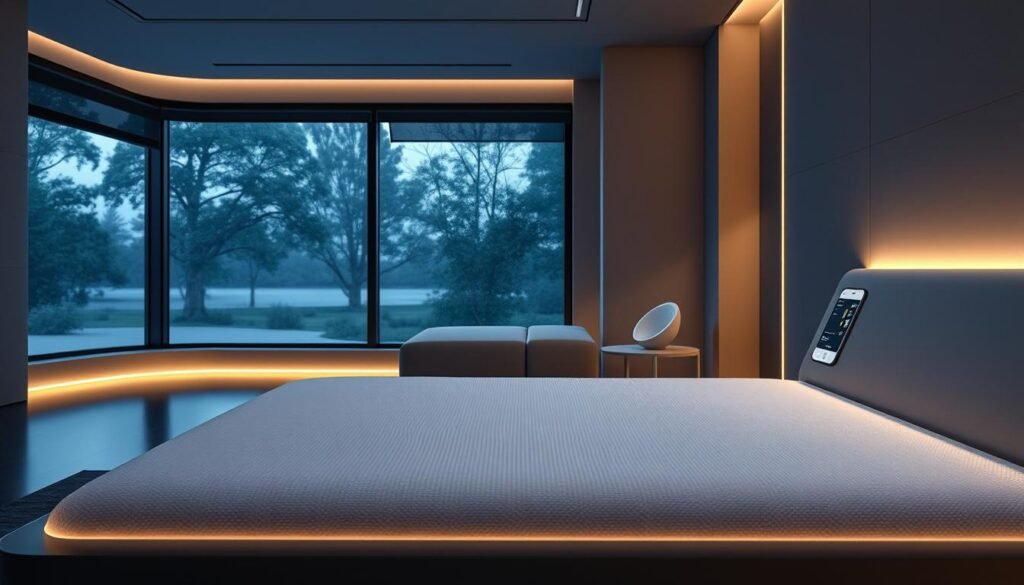
How? Embedded sensor arrays map pressure points in real time. If you toss or snore, the bed adapts. Some models, like Sleep Number 360, offer dual-zone temperature control. Each side adjusts independently, perfect for partners with different needs.
Luxury takes center stage with options like Heka’s $280,000 mattress. It combines climate tech, massage settings, and biometric tracking. But entry-level smart beds (starting at $1,499) still deliver core benefits:
- Split-bed functionality: Sync or separate settings for co-sleepers.
- Climate control: Warm feet, cool head? The bed makes it happen.
- Sleep tracking: Sensors track sleep stages without wearables.
These devices don’t just collect data—they act on it. Imagine waking up refreshed because your bed optimized your sleep environment all night. That’s the future, and it’s already here.
AI for Diagnosing Sleep Disorders
Sleep disorders affect millions, but advanced diagnostics are changing the game. Neural networks now analyze polysomnography data with 91% accuracy for insomnia detection. This leap forward comes from studying 250,000+ sleep patterns in clinical research.
Home sleep tests have entered a new era. FDA-cleared apps now match lab accuracy for 73% of patients. The table below shows how modern options compare:
| Method | Accuracy | Key Advantage |
|---|---|---|
| Lab Polysomnography | 89-94% | Gold standard for sleep apnea |
| AI Home Tests | 73-88% | Comfort & accessibility |
| Wearable Trackers | 68-82% | Continuous data collection |
Circadian rhythm disorders benefit from predictive models. These algorithms analyze light exposure, activity levels, and body temperature. Early detection helps reset biological clocks before health impacts occur.
“Combining clinician expertise with intelligence sleep systems creates powerful diagnostic frameworks,”
Leading hospitals now integrate these tools into sleep medicine practices. The key? Maintaining human oversight while leveraging sleep insights from machine learning. This balanced approach delivers both precision and personalized care.
From detecting restless leg syndrome to predicting sleep-onset delays, these innovations make invisible patterns visible. The result? Faster diagnoses and tailored treatment plans.
Personalized Sleep Environments with AI
Smart homes now tailor sleep spaces in real time. Connected devices sync to create the ideal sleep environment, adjusting everything from temperature to lighting. The result? A bedroom that learns your sleep habits and adapts nightly.
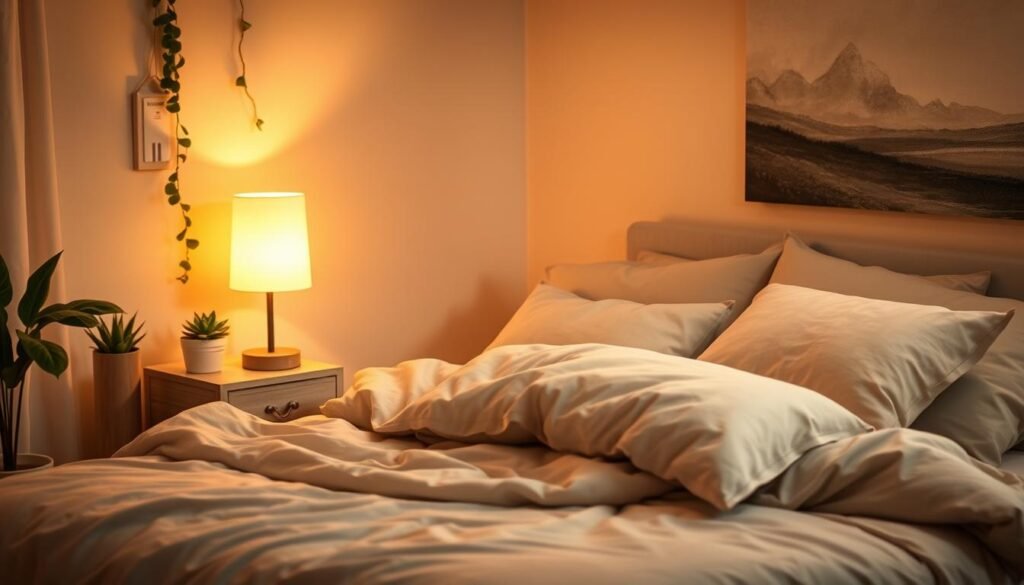
Thermostats like Nest tweak bedroom warmth with ±0.5°F precision. Philips Hue lights mimic sunset 90 minutes pre-bedtime, signaling your body to wind down. These sensors detect subtle changes, ensuring comfort all night.
White noise machines go beyond static sounds. Algorithms analyze ambient noise, adjusting volume and pitch dynamically. If a siren blares outside, your system compensates instantly.
Smart Home Ecosystems for Better Rest
| System | Key Feature | Integration |
|---|---|---|
| Nest Thermostat | 0.5°F temperature control | Works with Alexa, Google Home |
| Philips Hue | Sunset simulation | Syncs with sleep trackers |
| Withings Sleep | Mattress sensors | Adjusts room lights at wake-up |
- Full-room control: From smart blinds to aromatherapy diffusers, every element adjusts automatically.
- Sleep coaching: Smart mirrors display bedtime reminders based on your schedule.
- Voice commands: Ask Alexa to “start sleep mode” for lights-out in 10 minutes.
“Ambient intelligence turns bedrooms into responsive sleep labs—no wires attached.”
These systems work together to improve sleep quality. Over time, they spot patterns like late-night screen use or caffeine impacts. The goal? A bedroom that doesn’t just host sleep—it enhances it.
Privacy and Accuracy: What to Consider
Your sleep data tells a story—but who else is reading it? A staggering 68% of apps share information with third parties, per UC Berkeley studies. Meanwhile, 23,000 trackers faced FDA recalls for missing sleep disorders.
Guarding Your Sleep Data
Not all sleep tech protects users equally. HIPAA-compliant devices encrypt biometric data like heart rate and breathing patterns. Look for AES-256 encryption—the gold standard in healthcare.
Manufacturer checklists should include:
- Transparency: Clear data-use policies (no hidden sharing)
- Reliability: FDA-cleared or clinically validated
- Control: Options to delete stored information
When Tracking Disrupts Rest
Over-reliance on trackers can cause orthosomnia—an unhealthy obsession with perfect rest. Johns Hopkins researchers recommend tech detoxes twice weekly to reconnect with natural sleep cycle cues.
“Balance is key. Use data to inform habits, not dictate them.”
Trust your body’s signals alongside accuracy metrics. If you feel refreshed but your device says otherwise, question the tool—not your sleep.
Conclusion
Restful nights start with the right tech. With 79% of users reporting improved sleep, these innovations deliver real results—like 22 extra minutes of rest nightly.
Choose devices that match your needs, from wearables to smart beds. Always consult a clinician for persistent issues. Next-gen upgrades, like EEG headbands, promise even sharper insights.
Ready to transform your *nightly routine*? Take a sleep assessment today. Your best sleep quality could be one click away.
FAQ
How does artificial intelligence improve sleep quality?
AI analyzes sleep data from wearables and smart devices to provide personalized insights. It tracks patterns, detects disruptions, and suggests adjustments for better rest.
What’s the best sleep tracker for monitoring sleep cycles?
The Oura Ring Heritage and SleepScore offer detailed sleep cycle tracking. They use advanced sensors to measure movement, heart rate, and breathing patterns.
Can AI help diagnose sleep disorders like apnea?
Yes. Tools like Sleeptracker-AI and smart pillows analyze snoring and breathing irregularities. They flag potential issues for further medical evaluation.
Do AI-powered wearables affect privacy?
Reputable brands encrypt sleep data, but always check their privacy policies. Opt for devices with local processing to minimize cloud storage risks.
How does a smart bed enhance sleep health?
Beds like the Niteronic Z6 adjust temperature and position in real time. They respond to body changes, promoting deeper sleep cycles.
Are AI-generated sleep sounds effective?
Apps like Nightly use algorithms to create calming soundscapes. These mask disruptive noise, helping users fall asleep faster.
What’s the benefit of a smart alarm over traditional alarms?
Sleep Cycle’s smart alarm wakes you during light sleep phases. This reduces grogginess and improves morning alertness.
How accurate are AI sleep trackers compared to medical devices?
While not as precise as clinical polysomnography, consumer trackers like Pillow provide reliable trends. They’re great for spotting long-term habit changes.
Share this content:
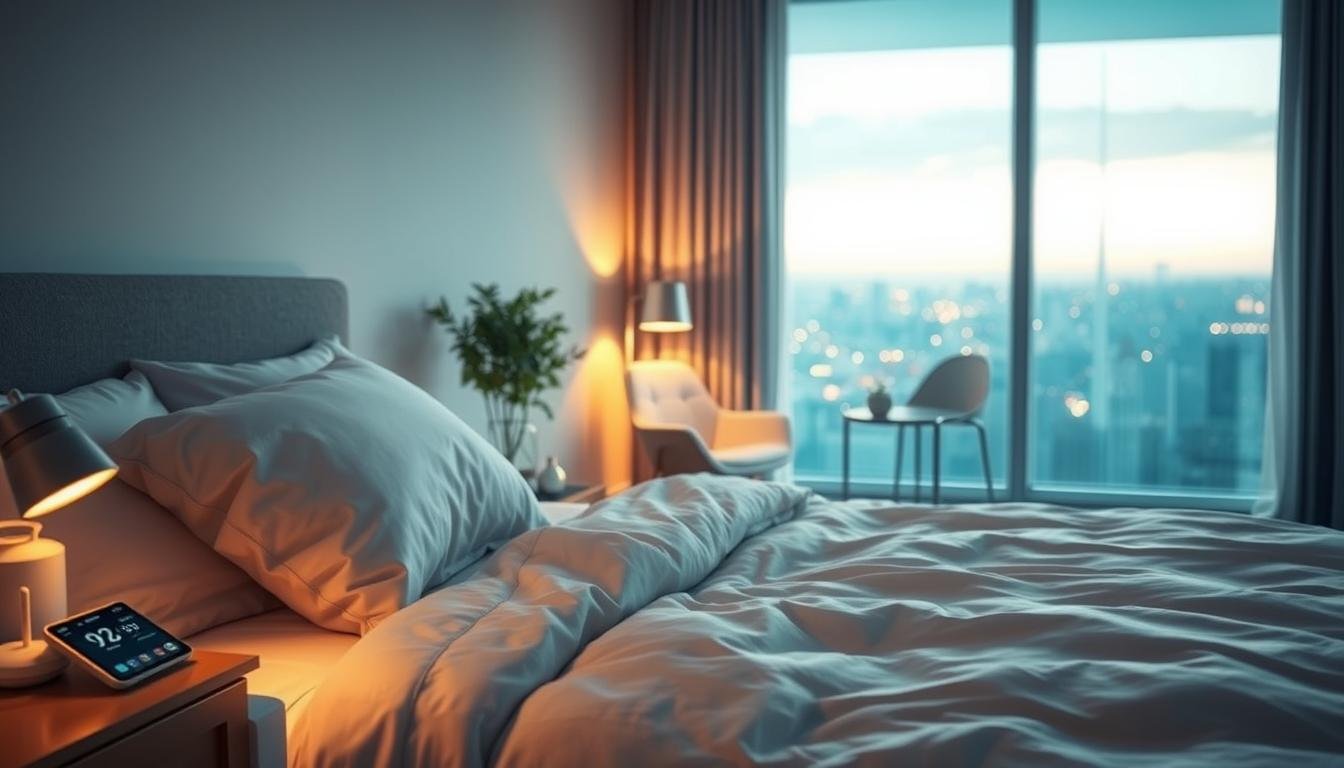
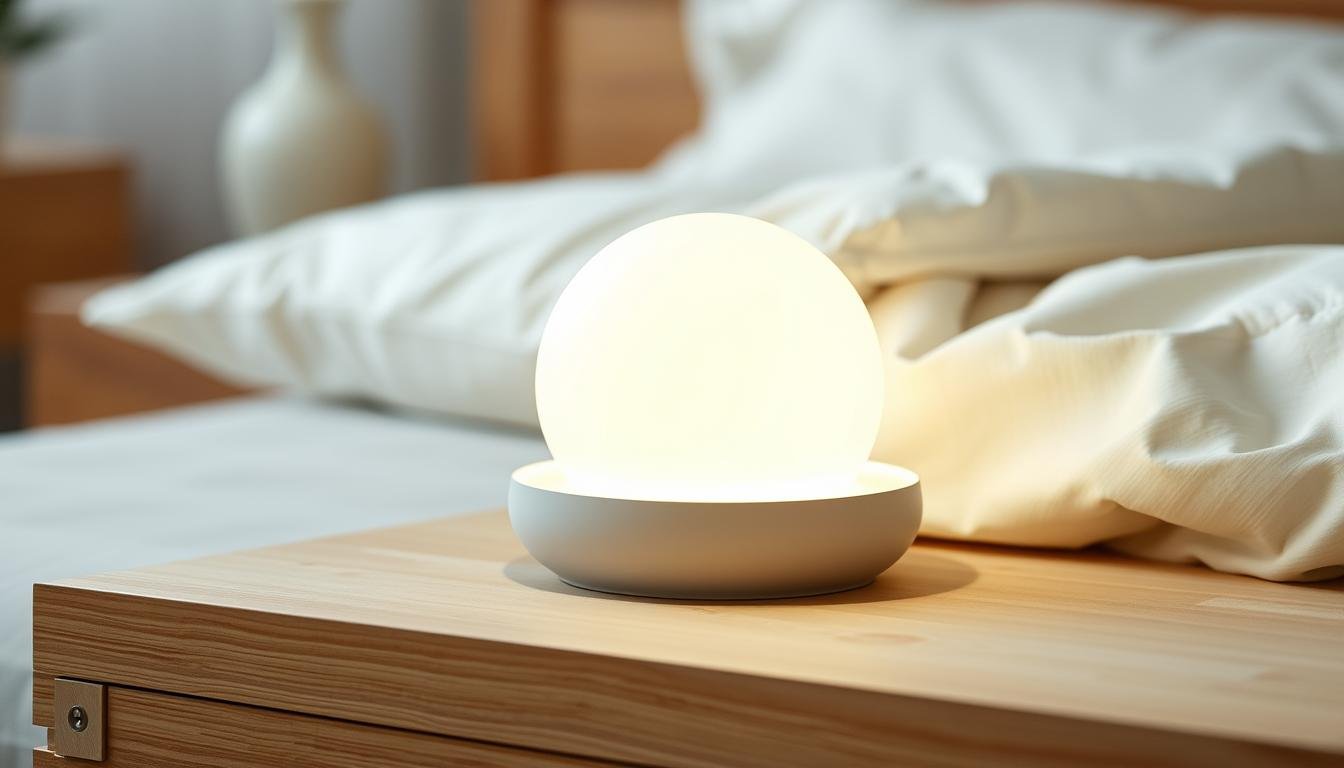
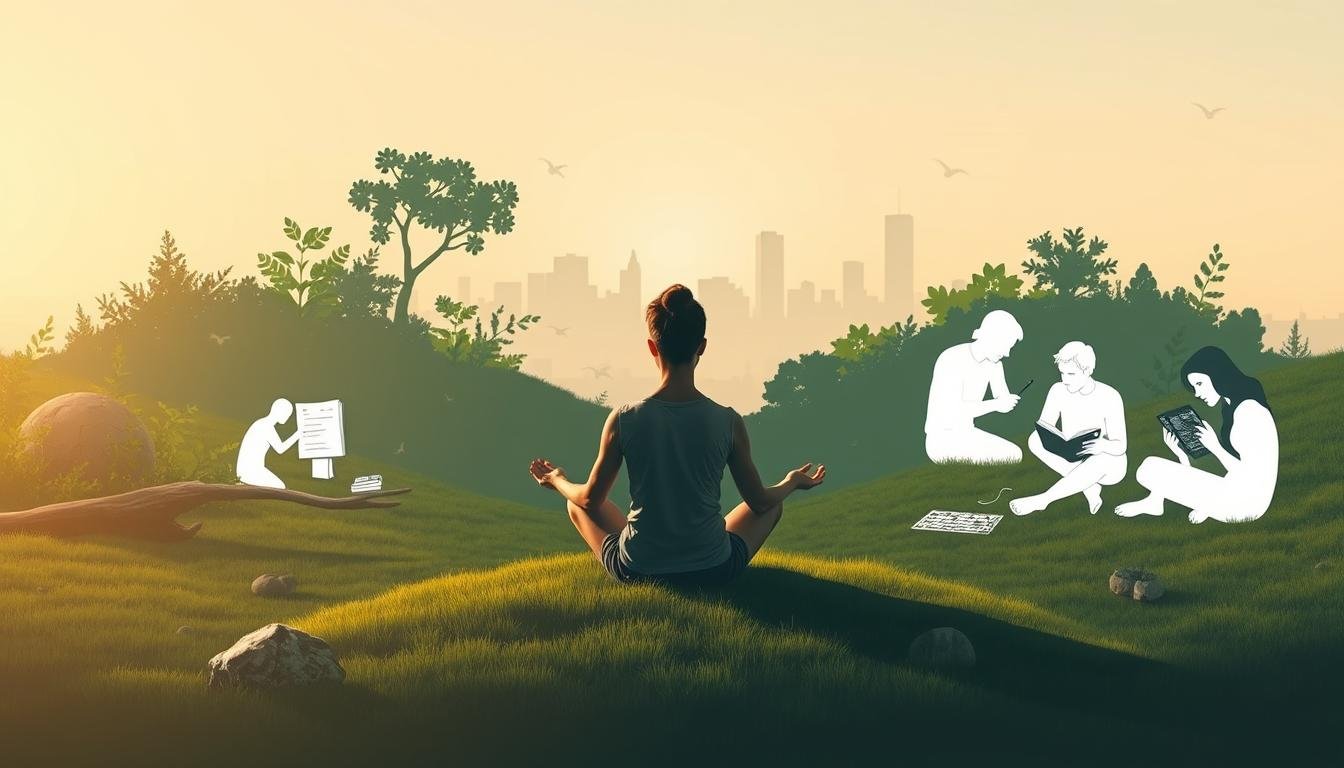
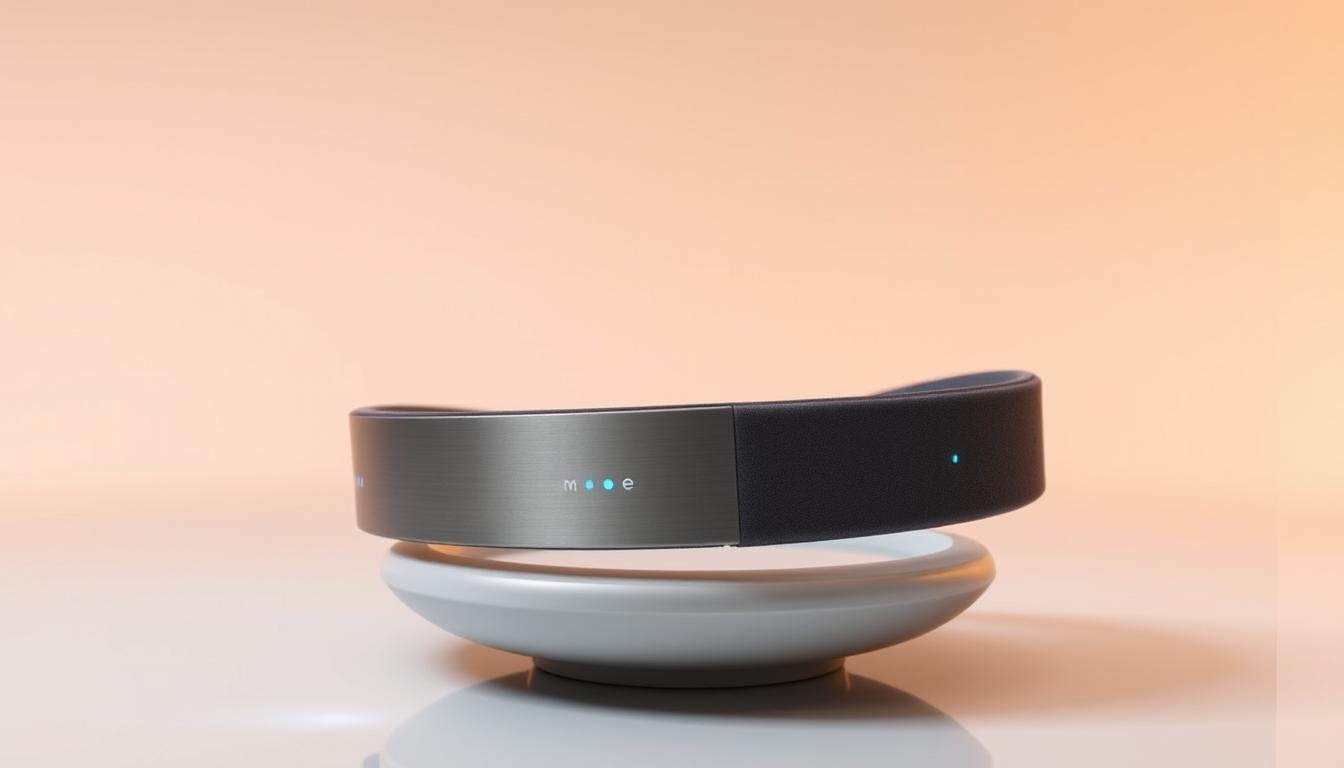
Post Comment